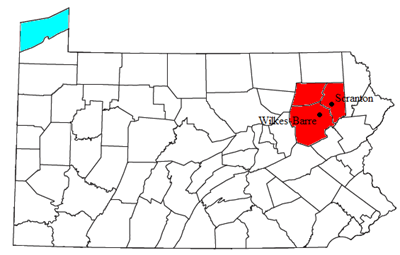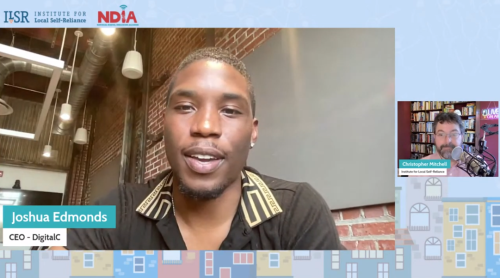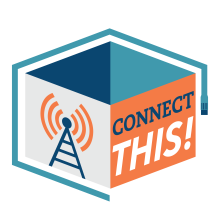
Fast, affordable Internet access for all.

The city of Scranton, Pennsylvania has issued a request for qualifications (RFQ) for vendors that may be tasked with constructing an affordable citywide fiber network. City leaders say the RFQ is the opening chapter in a bid to bring affordable broadband access to city residents long neglected by dominant regional monopolies.
According to the full RFQ, officials are looking for partner companies capable of building a citywide network capable of providing 1 Gbps (gigabit per second) download and upload speeds to all premises in the City of Scranton, as well as expanded fiber access for city municipal services and key anchor institutions.
“The City does not require municipal ownership of the fiber or a City operational role,” the RFQ states. “However, the City does request connectivity to certain City sites, a 40-year indefeasible right of use (IRU) for 12 strands of fiber for municipal noncommercial purposes throughout the network, and an access and maintenance agreement governing these strands.”

As with so many U.S. markets, broadband competition in Scranton is hard to come by. The market is largely dominated by either Comcast Xfinity or Verizon, the latter of which has been heavily criticized by unions and consumer groups for failing to uniformly upgrade its aging DSL network to fiber, and failing to repair aging lines on a timely basis.
This lack of meaningful competition results in slow broadband speeds, spotty coverage, substandard customer service, and significantly higher prices. Even then, the city hasn’t been without signs of life in the marketplace.
Syracuse officials have launched a new wireless community broadband network they hope will help bring affordable broadband access to the city of 145,000.
Dubbed Surge Link, the effort is backed by more than $3.5 million in federal funding and aims to deliver free broadband access to the city’s lowest income neighborhoods.
Motivated by peak pandemic connectivity headaches, Syracuse put out a request for proposal (RFP) late last year. The city then hired US Ignite as an advisor, and selected Geneva-based Community Broadband Networks (no relation to our program here at ILSR) to build a fixed wireless network capable of delivering discounted access starting with 2,500 underserved Syracuse households.
City officials tell ILSR the network is using Fixed Wireless Access technology, specifically Citizens Broadband Radio Service (CBRS), which is an emerging technology a growing number of municipalities and other nonprofit community groups have been experimenting with as a way to bring broadband to unserved and underserved residents in dense settings. And while CBRS has promise, as US Ignite notes, “because the technology is relatively new, the hardware and software associated with CBRS networks is also new. Vendors may still be working out the kinks in their solutions, particularly if those solutions are being used in novel ways, or need to interface with other older systems.”
It should also be noted that another New York community (Westchester County) embraced CBRS, only to find that it could not deliver the capacity they wanted to many people who needed the service.
With the Affordable Connectivity Program (ACP) poised to run out of funding in early Q2 next year, and no funding source lined up to keep the program alive, a recent U.S. News & World Report survey underscores the significance of the program in the face of rising prices from the nation’s major Internet Service Providers (ISPs).
The ACP offers a monthly benefit of $30 dollars for qualifying households and $75 for qualifying households on Tribal lands (as well as in some remote areas). Over 20 million Americans to date have enrolled in the program to help pay their Internet service bills, but with the $14.2 billion ACP program on track to run dry as soon as May of next year – even amid a historic national effort to establish “Internet For All” – the affordability crisis has become more worrisome for a growing number of Americans.
U.S. News & World Report’s survey found that Internet prices are going up and that families are compromising other expenses to pay for connectivity, affirming the urgency among digital equity advocates to identify a source of continued funding for ACP, as well as push for more structural solutions that address the root causes of why Americans pay among the highest prices for broadband service in the developed world.
Cleveland, Ohio is putting the finishing touches on an ambitious plan to build a citywide open access fiber network–and deliver affordable fixed wireless service–at minimal cost to city residents. The double-edged proposal aims to bring both meaningful broadband competition–and lower rates–to the long neglected city of 1.7 million people.
Last month, the city announced it had awarded $20 million in ARPA (American Rescue Plan Act) funds to Cleveland-based digital equity non-profit DigitalC. Under the proposal, DigitalC will spend 18 months building a fixed wireless broadband network capable of providing locals with symmetrical 100 Megabit per second (Mbps) service for $18 a month.
DigitalC’s fixed wireless service, EmpowerCLE+, launched in 2018 and accelerated its deployment in 2020 to meet the needs of frustrated parents and workers during peak COVID.
Speaking at ILSR’s and the National Digital Inclusion Alliance (NDIA) Building for Digital Equity (B4DE) event last week, DigitalC CEO Joshua Edmonds noted that the EmpowerCLE+ network currently passes 23,500 households in Cleveland, with 2,300 current subscribers. The city’s new agreement with the city should expand the network’s potential reach to 99.9% of homes in Cleveland.

“We're thankful for the opportunity and we're just really hoping that people use this as motivation to change things within their respective markets,” Edmonds told ILSR in a phone interview.

This week on the podcast, Christopher is joined by Karl Bode, a returning guest who has long covered tech and the telecommunications industry. After a short conversation about the continued absence of monopoly abuse in policy conversations about broadband access and affordability today, Karl and Christopher tackle the proposed return to net neutrality announced by Chairwoman Rosenworcel last week.
They talk about how we got here in the first place, including the landmark decision by the Commission in 2015 to largely abdicate responsibility for Internet-related regulatory activities and the states that stepped in to fill the void. They end the show by considering for a bit what it might be like to have an expert federal agency whose activities governed by a strong regulatory framework and the teeth to enforce its mandate to extend fast, affordable, reliable Internet access for all.
This show is 38 minutes long and can be played on this page or via iTunes or the tool of your choice using this feed. You can listen to the interview on this page or visit the Community Broadband Bits page.
Transcript below.
We want your feedback and suggestions for the show-please e-mail us or leave a comment below.
Listen to other episodes here or view all episodes in our index.
Subscribe to the Building Local Power podcast, also from the Institute for Local Self-Reliance, on iTunes or Stitcher to catch more great conversations about local communities, the concentration of corporate power, and how everyday people are taking control.
Thanks to Arne Huseby for the music. The song is Warm Duck Shuffle and is licensed under a Creative Commons Attribution (3.0) license.
Lancaster, Pennsylvania has revitalized the city’s long percolating plan for a municipal broadband network, this time via a public-private partnership (PPP) with Shenandoah Telecommunications Company (Shentel). The city’s quest for more affordable, reliable broadband is a quest that’s taken the better part of a decade to finally come to fruition.
Lancaster city officials recently announced that they’d selected Shentel with an eye on ensuring uniform broadband availability to the city of 57,000.
“In 2022, the City issued an RFP for a partner to achieve stated goals, which received five responses, and led to the selection of Shentel,” the city said. “The contract will result in Shentel installing fiber at its sole cost to provide service to 100% of the city’s residents. Shentel plans to commence design and construction immediately upon execution of the final agreement.”
According to Lancaster officials, the city hired CTC Technology & Energy Engineering & Business Consulting to evaluate the city’s needs. The determination to proceed with a PPP with Shental was driven, in part, by the historic broadband grant opportunities being created thanks to the 2021 Infrastructure Investment and Jobs Act (IIJA), and the American Rescue Plan Act, the latter of which provided $39.5 million to the city.
Murfreesboro, Tennessee suddenly finds itself awash with looming broadband competitors thanks to the city’s booming growth. In less than a month, United Communications – owned by not-for-profit electric cooperative Middle Tennessee Electric (MTE) – and Google Fiber have unveiled major plans to expand affordable gigabit fiber within city limits.
MTE-owned United Communications says it has some big plans for the city of 157,000, starting with broadband upgrades for the utilities’ 77,000 existing electricity customers.
According to a recent announcement, the cooperative-owned ISP will spend $85 million in existing cash reserves to deploy 1,400 miles of fiber in the city, bringing affordable gigabit access to existing MTE electricity customers. As with many utility deployments, the upgrades will prove beneficial for electrical grid monitoring and maintenance.
“We’ve already completed phase one in the Boro, which includes our fiber backbone and service to more than 1,000 homes and businesses. As part of phase one, we also built fiber to the square in downtown Murfreesboro,” United President and CEO William Bradford said in a statement. “It was a privilege to put our fiber infrastructure to work by connecting our neighbors in disadvantaged communities and adding resiliency to the local emergency communications network.”

Last year, United received $53.4 million in grants from the Tennessee Emergency Broadband Fund (made possible by the The American Rescue Plan Act of 2021) to help shore up broadband access in numerous Tennessee counties, including Bedford, Franklin, Giles, Lincoln, Marshall, Maury, Moore and Williamson.

This week on the podcast we bring back a fan favorite from a year ago that feels particularly relevant, especially as the FTC prepares itself to undertake landmark antitrust cases against Google and Amazon.
Christopher is joined by Harold Feld, Senior Vice President at Public Knowledge. Feld is a staple of the field, and has been a consistent voice not only for consumers but broadband advocates of all types for more than two decades.
The show takes on a reflective nature, as they talk about theories of change in the context of doing broadband policy today. Harold shares how he thinks of the progress that gets made in the long term by aligning the corporate incentive with the public interest. He shares coming to terms with having lots of hard days, the power of fighting battles you expect to lose, and learning, getting better, and building powerful coalitions along the way. Harold and Christopher end the show by talking about some examples of the latter, including important wins like the Rural Tribal Priority Window and the expansion of community networks of all shapes and sizes.
This show is 48 minutes long and can be played on this page or via iTunes or the tool of your choice using this feed. You can listen to the interview on this page or visit the Community Broadband Bits page.
Transcript below.
We want your feedback and suggestions for the show-please e-mail us or leave a comment below.
Listen to other episodes here or view all episodes in our index.
Subscribe to the Building Local Power podcast, also from the Institute for Local Self-Reliance, on iTunes or Stitcher to catch more great conversations about local communities, the concentration of corporate power, and how everyday people are taking control.
Thanks to Arne Huseby for the music. The song is Warm Duck Shuffle and is licensed under a Creative Commons Attribution (3.0) license.

Join us Thursday, September 28th at 3pm ET for the latest episode of the Connect This! Show. Co-hosts Christopher Mitchell (ILSR) and Travis Carter (USI Fiber) will be joined by regular guest Doug Dawson (CCG Consulting) and Kim McKinley (UTOPIA Fiber), with special guest Sean Gonsalves (ILSR) to tackle the promised return of net neutrality rules by the FCC, Google Fiber's recently announced ACP plans, why the word "monopoly" seems in such short supply in the BEAD plans states have begun to file, and the future of spectrum sharing in the United States.
Email us at broadband@communitynets.org with feedback and ideas for the show.
Subscribe to the show using this feed or find it on the Connect This! page, and watch on LinkedIn, on YouTube Live, on Facebook live, or below.
As the National Telecommunications and Information Administration (NTIA) continues to move forward in administering the single biggest federal investment to expand high-speed Internet access in U.S. history, each state and U.S. territory is wrestling with how to best spend the windfall as they lay out their Five Year Action Plans and Initial Proposals necessary to claim their portion of the $42.5 billion BEAD program.
One major barrier to providing universal access to fast, reliable and affordable Internet service–long recognized by ILSR, telecom experts, and a growing number of ordinary citizens–are the monopoly-friendly preemption laws that either outright ban or erect insurmountable barriers to building publicly-owned, locally-controlled broadband networks, aka municipal broadband.
Preemption in the BEAD Era
Currently, 17 states have such preemption laws, most of which have filed their Five Year Action Plans and/or their Initial Proposals. In each of those states, at the behest of Big Cable and Telecom incumbents, state lawmakers have erected legislative barriers to municipal broadband to protect the monopoly players from competition, which is at the very heart of why the digital divide exists in the first place and why tens of millions of Americans suffer from the slower speeds and higher costs that go hand in hand with monopoly service.